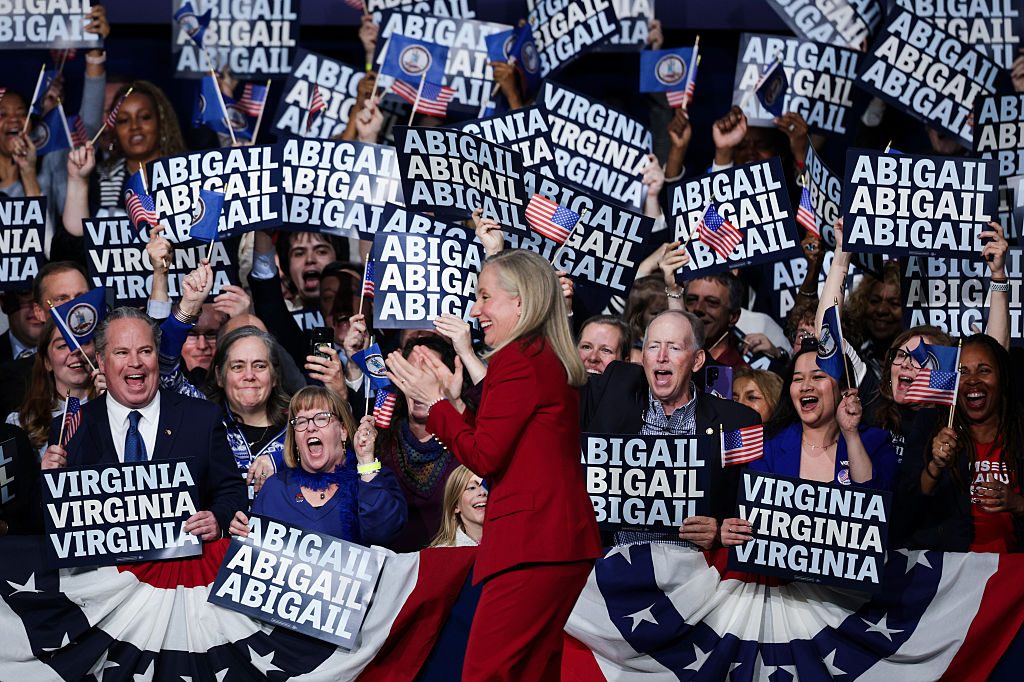“Tonight we sent a message,” Abigail Spanberger said in her victory address after winning the Virginia governor’s race, as last night’s suburban shockwave gave the Republican Party cause for concern ahead of 2026 and 2028.
Democratic victories in the off-cycle elections in Virginia and New Jersey are hardly surprising. Both states lean Democratic, and their off-year elections trend against the party occupying the White House. However, the margin of blue victories might be more telling. Leading by double digits, Spanberger took one of the largest gubernatorial victories in decades as Democrats won across the board in Virginia’s statewide elections. In New Jersey, Mikie Sherrill also cruised to an easy win, despite polls suggesting that the governor’s race there could be close.
The results are partly down to the fact that, during the Trump years, Republicans have lost ground with college-educated suburbanites, and this trend weighed particularly heavily on the GOP last night. Pummelled by DOGE, Northern Virginia’s DC suburbs swung hard to the Democrats: Fairfax, Loudoun, and Prince William counties all went at least 12 points more Democratic yesterday evening than on election night in 2024. According to exit polls, Republicans lost college-educated voters by about 27 points in Virginia and 24 points in New Jersey. Democrats’ strength with well-educated voters now gives them an advantage in off-cycle elections.
Republicans might be inclined to dismiss these election results because of those structural factors, or they might simply chalk the losses up to candidate quality. And it’s true that political insiders were fretting about the Virginia governor’s race as far back as May. But incumbent Republican Attorney General Jason Miyares ran a strong campaign in the state, and New Jersey GOP nominee Jack Ciattarelli is a veteran politician who came within a few points of winning in 2021. These men did not suddenly lose their political touch. Instead, they were fighting uphill in a political landscape that has turned against them.
Republicans hold a trifecta in Washington, and the second Trump administration has gambled on an agenda of maximal disruption. But the pace of that disruption might now be generating political friction, just as the frantic government overreach of Democrats in 2021 paved the way for a working-class Republican realignment. In both Virginia and New Jersey, exit polls showed that the economy was far and away the most important issue to voters — and those same voters overwhelmingly backed the Democrats. Younger Americans also heavily favoured Democrats, and a particularly ominous stat for Republicans is buried in both states’ exit poll data: voters who disapproved of both parties went for Democrats in a landslide. These “double hater” voters had been a key part of the Trump coalition but, now that Republicans are in power, these sceptics may be lurching towards the Democratic Party.
Exit polls found that over a third of Virginia voters came out to express their displeasure with Trump, but under 15% were there to back the President. While an off-year election might give disproportionate weight to anti-Trump diehards, this finding also indicates a deeper obstacle for Republicans: Trump’s presence in office might turn out voters who oppose him, while his absence from the ballot might cause some of the politically disengaged Americans who voted for him in the past to stay home. Republicans can’t rely on a Trump ex machina to save them in future elections, and they are no longer part of an insurgent political party. Instead, they need to show that they can deliver on affordability and restore economic confidence. For the task of forging a durable governing coalition, kitchen-table issues matter more than red meat for the influencer class.











Join the discussion
Join like minded readers that support our journalism by becoming a paid subscriber
To join the discussion in the comments, become a paid subscriber.
Join like minded readers that support our journalism, read unlimited articles and enjoy other subscriber-only benefits.
Subscribe